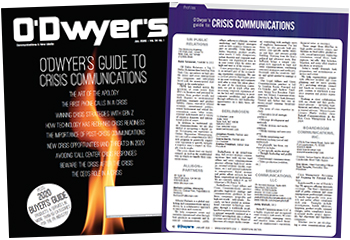 Phil Denning Phil Denning |
It’s impossible to know where the fires will erupt in 2020—faulty airplanes, college admission scandals, more “Me Too” moments, the recent Hallmark Channel advertising fiasco, or perhaps some Presidential election tweets—but there’s no doubt that the embers are already smoldering. While these aren’t the items we want on our typical “holiday list,” it’s prudent to do a quick refresher as we enter the New Year.
Generally speaking, every crisis will share some basic characteristics: it’s an unplanned, negative event—whether real or broadly perceived to be true—that’s public and sufficiently serious to have a meaningful impact on the business:
Unplanned. Crises are difficult to entirely prevent or immediately control, as by their nature they typically arise suddenly and unexpectedly.
 |
| This article is featured in O'Dwyer's Jan. '20 Crisis Communications Magazine. |
Negative. A crisis adversely impacts the company, or has the potentially to adversely impact the company if publicly known.
Public. While some crises can be handled internally, all have the potential to impact operations should they become public, while those that are already publicly known are particularly threatening.
Serious. Many crises threaten a significant or lasting impact to the business if handled ineffectively.
These events can take many forms, and companies may face crisis issues at every phase of a business. They can run a broad gamut across business verticals and personnel activity—including executive malfeasance, data security, litigation or regulatory sanctions, HR issues, natural disasters, product failures, workplace violence or many others—that can be reputational, operational or financial in nature. All three types can prove critically damaging to a brand.
Your response to a crisis can define your brand—for better or worse
Stakeholders and consumers can forgive corporate mistakes or transgressions, provided the company responds appropriately, but they also possess long memories for botched or nonexistent responses. Decision-makers and executive teams facing a crisis must think and act quickly, but must also think and act strategically.
The primary goals of crisis management are to limit the damage, preserve the company’s relationships and reputation and establish a foundation for recovery, enabling the business to return to normal course as soon as possible. In order to achieve these goals, decision-makers should adhere to the following principles of crisis response:
Speed. Response teams must move as quickly as possible to prevent rumors and speculation from filling the communications vacuum.
Control. Aim to take the initiative and lead the story before others define your narrative for you.
Knowledge. It’s critically important that your first communications are honest and factually accurate. Teams must immediately identify the essential information pertaining to the situation, including who’s involved, what occurred, where and when the crisis presented itself, and how it escalated.
Thoroughness. Provide all information relevant to the crisis at the same time. Don’t allow updates to continue to trickle out over weeks or months; releasing information reluctantly only drags out coverage of the crisis in the media. Close the information and media loop as soon as possible.
Honesty. Be clear about what you know and don’t know, and never speculate or tell misleading half-truths. This approach conveys arrogance and challenges adversaries to uncover the full story. Additionally, a company’s response to a crisis can define the public’s perception of the brand. Reaffirm why your brand deserves the public’s trust.
Evolve. Constantly monitor all activity and coverage around the crisis, and be ready to take a new angle. Even the most prepared communications team can be surprised as events unfold, so be nimble and adjust to unforeseen developments.
Executive teams must keep these principles front of mind as they craft response strategies. Taken together, these principles boil down to the critical importance of prompt, open and transparent communication with stakeholders and with the public.
Companies in crisis are most able to regain the public’s trust when they explicitly communicate the precise steps they are taking to address the situation, and actively demonstrate that these steps will lead to a successful resolution of the matter. Communicating process, in the absence of complete knowledge or facts, indicates to the public that you’re not ignoring the problem and that you intend to be responsible guardians of your brand and your consumers’ trust.
How you do it is just as important as what you do
Finally, with these response principles and objectives in mind, companies should consider the following when actually crafting and delivering communications in response to a crisis:
Timing. While the first 24 hours are critical in defining your response, it’s just as important to continue to monitor and manage the ongoing flow of news to provide sufficient commentary to maintain control of the narrative and avoid a news vacuum that might otherwise get filled by erroneous or speculative commentary.
Clarity. Refrain from theorizing or thinking out loud, stick to the facts as you understand them and update as appropriate going forward. Provide written statements where possible to ensure that your message is clearly disseminated, and avoid making statements that you may have to correct or contradict later on. Remember you’re typically speaking to a broad public, so limit the use of industry jargon and speak in plain language when possible.
Empathy. Nothing is more important than expressing genuine concern for whatever has happened and those who may have been impacted. The public can forgive error, but it will have no tolerance for apathy or indifference. Sometimes this will necessitate providing a human face for the company in its communications. Choose wisely. And demonstrate that concern through both words and deeds.
Accountability. Accountability isn’t the same as responsibility. Nothing is more frustrating in the aftermath of crisis event than finger-point and buck-passing amongst the parties involved. Assert leadership and demonstrate a commitment to doing whatever it takes to fix the problem, find out how and why it happened, and make sure it never happens again (even when it isn’t your fault!).
Finally, the time to review these principles and envision how they apply to your organization is before you experience an incident. Every company should undertake a crisis preparedness planning process that looks at the various threat scenarios they are most likely to face and then organizes hypothetical response plans for each that adhere to these principles.
Response speed is more critical than ever in today’s connected world of instant communication, and the only way to quickly—and effectively—communicate in a crisis is to have fully anticipated and practiced that response in advance.
Company Boards and management teams should consider these safeguards when making their 2020 New Year’s resolutions!
***
Phil Denning is a Partner at ICR.


 There’s a fine line between newsjacking and taking advantage, aka ambulance chasing. Our job as PR professionals is to tread it carefully.
There’s a fine line between newsjacking and taking advantage, aka ambulance chasing. Our job as PR professionals is to tread it carefully. PR firms need to be mindful of ways their work product may be protected by the attorney-client privilege whenever working with a client’s internal legal team or its external legal counsel.
PR firms need to be mindful of ways their work product may be protected by the attorney-client privilege whenever working with a client’s internal legal team or its external legal counsel. Manuel Rocha, former US ambassador and intenational business advisor to LLYC, plans to plead guilty to charges that he was a secret agent for Cuba.
Manuel Rocha, former US ambassador and intenational business advisor to LLYC, plans to plead guilty to charges that he was a secret agent for Cuba. CEO mentoring is an often-overlooked aspect of why CEOs are able to make good decisions, and sometimes make bad ones—all of which intersects with the role and duties of a board.
CEO mentoring is an often-overlooked aspect of why CEOs are able to make good decisions, and sometimes make bad ones—all of which intersects with the role and duties of a board.  How organizations can anticipate, prepare and respond to crises in an increasingly complex world where a convergent landscape of global challenges, threats and risks seem to arrive at an unrelenting pace.
How organizations can anticipate, prepare and respond to crises in an increasingly complex world where a convergent landscape of global challenges, threats and risks seem to arrive at an unrelenting pace.


 Have a comment? Send it to
Have a comment? Send it to 
No comments have been submitted for this story yet.